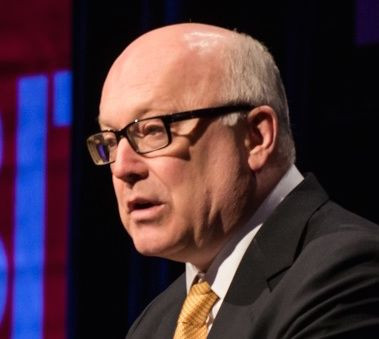Prime Minister Malcolm Turnbull's Office refuses to endorse Brandis' same-sex marriage timetable

The Prime Minister’s Office has refused to back Attorney-General George Brandis’ commitment to a same-sex marriage plebiscite this year. A spokeswoman said the government was “committed to a plebiscite as soon as possible after the election. The timing is dependent on the election timing.”
Earlier story:
Brandis said a re-elected Turnbull government would hold its promised plebiscite on same-sex marriage this year – and predicted it would be carried.
He said the bill for the popular vote would be introduced early in the new parliament. “That plebiscite we plan to hold before the end of this year.”
The fast timetable seems to strengthen the prospect of an election being held sooner rather than later – whether a double dissolution or an ordinary election.
A double dissolution would be on July 2; Malcolm Turnbull keeps repeating he expects a full-term election – which would be in August, September, or October. But an election late in this period would not leave time for a plebiscite.
That point is reinforced by Brandis’ answer when it was put to him that, assuming a successful plebiscite, same-sex marriage would be legislated early in the new parliament. He replied: “I would expect it to be legislated by the end of this year.”
The timetable indicates that Turnbull, once he had his own popular mandate, would be anxious to get on quickly with his preferred agenda – something he has been inhibited from doing because of commitments given to the conservatives in his party and to the Nationals.
Having the same-sex marriage vote this year could also facilitate sticking to a May 2017 timetable for the Indigenous recognition referendum, which would be squeezed if the plebiscite were pushed to early next year.
Opposition Leader Bill Shorten has promised a Labor government would legislate for same-sex marriage within its first 100 days.
The shadow attorney-general, Mark Dreyfus, and Terri Butler, shadow parliamentary secretary to Shorten, said in a statement that the fact the Turnbull Liberals would waste A$160 million on a plebiscite “has exposed the lengths Malcolm Turnbull is going to placate the far-right wing of his party”. They said the legalisation of same-sex marriage could happen now. “This is what the majority of Australian people want.”
Brandis told Sky he personally now favours same-sex marriage – “a position I have come to over the years”.
He likened his stance to that of British Prime Minister David Cameron. “David Cameron famously said that he supported same-sex marriage not in spite of the fact that he was a conservative but because he was a conservative,” Brandis said.
“I believe that marriage is one of the fundamental institutions of society and I think it’s important that the fundamental institutions of society reflect the fundamental values of society. And treating … gay people equally is, we might think, one of the fundamental values of modern Australian society.”
The government’s outlining of a timetable came a day after Turnbull attended the Mardi Gras in Sydney, as he has a number of times before. Brandis said it was probably the biggest annual event in Turnbull’s Wentworth electorate and it was both a good thing and unremarkable that he was there.
Brandis reaffirmed that in a change of law there would be protection for churches to conduct ceremonies in accordance with their own beliefs. “What we’re talking about changing is the civil definition of marriage.” The Marriage Act at present says marriage is between a man and a woman.
In recent weeks Brandis has been in discussions with various stakeholders from both the “yes” and “no” sides, including the churches. What they all wanted was a fair and transparent process, he said.
Brandis said if the plebiscite were carried there was “virtually no doubt at all” that parliament would legislate that result, but MPs who disagreed should be able to exercise their conscience. For example, it would be “perfectly understandable why a member of parliament representing a conservative electorate and having conservative views themselves might choose to vote no and I don’t have a problem with that”.
The Australian Christian Lobby welcomed the clarification of the timetable. But, in what opponents will seek to make an issue in the campaign, managing director Lyle Shelton said: “While we welcome Senator Brandis' recognition that protection is needed for religious wedding celebrants, freedom-of-conscience rights must also be extended to people of faith or no faith who supply services to the wedding industry.”
“In the United States and Europe, bakers, florists, photographers and wedding chapel owners have all fallen foul of the law, and in some cases have incurred big fines, for exercising their conscientiously held views about the truth of marriage. Clergy are not the only ones with freedom-of-conscience rights.”
Michelle Grattan, Professorial Fellow, University of Canberra
This article was originally published on The Conversation. Read the original article.





















